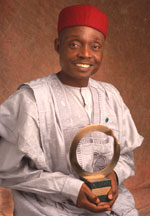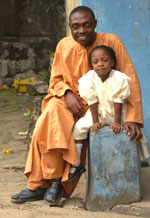In southeastern Nigeria, private logging companies are felling the country’s last remaining rainforests. These hardwood forests shelter the highest diversity of primates in the world and some 20 percent of the planet’s butterfly species.

Odigha Odigha.
Photo: Goldman Environmental Prize.
Odigha Odigha grew up in and around these forests, in the Ijagham community of Cross River State. In the mid-1990s, after receiving an MBA at the University of Lagos and pursuing a career in politics, he returned home to find that the forests of his childhood had been obliterated by loggers. He began speaking out against the destruction, especially against illegal logging by the Hong Kong-based Western Metal Products Company.
It was a terrifying time to be an activist in Nigeria. The dictatorship of General Sani Abacha was notoriously corrupt and violent; in 1995, the government executed Ogoni activist Ken Saro-Wiwa after he criticized the environmental and social destruction wrought by oil development in the Niger Delta. Odigha lived underground from 1996 to 1998, quietly continuing his grassroots work in rainforest communities.
Under the new civilian government, in place since Abacha’s death in 1998, Odigha has resurfaced to continue his work in public. His advocacy has helped secure a moratorium on logging in Cross River State, forced the government to begin the nation’s first-ever environmental impact assessment, and created Cross River State’s first Forestry Commission.
Odigha spoke to Grist from San Francisco, Calif., where, on April 14, he will be awarded one of six 2003 Goldman Environmental Prizes.
What made you decide to fight industrial logging in your home state?
It has to do a lot with my childhood upbringing. I grew up in a forest area, and the forest was quite appreciated; it was important for food, for recreation, for our education. Forty years later, all of that is gone, and it’s directly related to logging companies. The only way to have a little bit of the forest left is to stop the destruction caused by commercial logging. So that’s how I got inspired.
What was your first step as an activist?
The moment we started fighting, we thought the best thing was to get all the stakeholders involved, talk to them and tell them these private concerns are not in the best interest of the people, that the people need to be protected from them. The best [entity] to do that was the government, so we tried to show the government that the logging was in opposition to these communities. We couldn’t do that, so we had to go to court.
We went to court, and tried to get the government to enforce its regulations, its laws. When we were unsuccessful with that, we called on the international community, and there were 3,000 letters sent to the Abacha regime. He didn’t find that funny. He thought the best thing was to hit back at us, and that’s why some of us had to go underground. I became an object to be arrested, so I restricted my activities to forest communities and got out of reach of Abacha.

Odigha Odigha.
Photo: Mieke Kramer.
What gave you the courage to continue your activism during that time?
It was very frightening, but when you have a deep conviction about a thing you don’t leave it behind. What I did have to tell myself was, “If you fight and run away, you’ll live to fight another day. If you die in this struggle, your struggle may not continue.” At the time Ken Saro-Wiwa was killed, we were talking about forestry in Cross River State, but not many people knew about [our campaign]. Now I can tell you very confidently that they can’t kill this movement just by killing Odigha. We have so many Odighas now, so many voices that are very strong.
How has your work changed since the death of the dictator and the election of a new government?
When we had the civilian government in place, we had a window of opportunity. So we asked for a moratorium on logging, and made a request for the creation of a Forestry Committee that would have NGO [non-governmental organization] participation. This was granted, and two NGO representatives were appointed to the Forestry Commission. This enables us to give input on sustainable management.
How have forest communities — the people who live in the rainforest — been involved in your campaign?
They are very receptive to our campaign. They’ve been sensitized, they know that logging is trying to offer them some immediate comfort and gratification. They know that the logging companies don’t keep to their promises. We’re coming to them as their friends, we’re not asking them for any return, we’re trying to invest in their lives. We’re just trying to sensitize them to sustainable management and provide them with alternatives.
What can U.S. activists do to help your campaign?
If there’s no market for wood from that area, if there’s no market for wood gotten in an unsustainable or illegal way, that will ease the pressure on these forests. If there is a market for non-timber, forest-friendly products from that area — mushrooms, honey, things like rattan — people [in the forest communities] will be encouraged to protect the forest. If we can get help with [creating that market] from the NGOs here, that will help the forest.

What does this prize mean for your work?
It’s wonderful. I feel ready to launch back and do more vigorous work. It’s a sign of approval, not just from the American community but from the global community. It means a lot to me that the global community has recognized me. It means I have a lot to do.
What will you do with the money?
My family has made some sacrifices. We had to dispose of some personal effects to get resources for the work. I had to deny my family the privilege of proper accommodation. That was quite inconveniencing, especially because of the political persecution. So a little bit of the money will go to make them a little more comfortable. The rest will be re-granted to forest communities, to help them come up with sustainable alternatives to logging.

